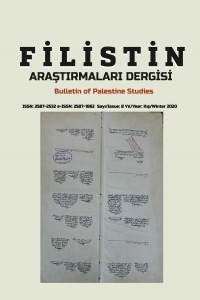
Filistin Araştırmaları Dergisi
Yazarlar: Yusuf Süha SONUÇ
Konular:Siyasi Bilimler, Sosyal Bilimler, Disiplinler Arası, Tarih
DOI:10.34230/fiad.425901
Anahtar Kelimeler:Religious Zionism,Palestine,Holy Land,Uganda Scheme,Greater Israel
Özet: Israeli society has social diversity. Up to the 19th century, this diversity originated from the religious views of the Jews and from the religious interpretations of the established religious groups. With the spread of secularism in the 19th century, this diversity has been divided into two main circles, religious and secular Jews. It is also possible to say that it is also present in Zionism, an ideological and social movement that emerged in the 19th century and was accepted by Jews in the same century. Zionism is briefly summarized as the wishes of the Jews to form a state in Palestine. However, the secular Zionists, who outnumber in World Zionist Organization, had not mentioned for a time in their studies, ideological books regarding Zionism, and diaries that their prospective state’s place is Palestine, Jerusalem. The pioneers of Religious Zionism, another front within Zionism, insisted on Palestine many years before the Secularists. They had always made it on religious basis although they supported the Uganda Plan for a while and behaved contrary to their wishes. In this study, reasons for insistence on the Palestinian issue of those who advocate the idea of Religious Zionism, the reasons for concessions and the lessons they have learnt from concession are discussed. Due to its content, the topic is limited from the emerging World Zionist Organization to the World War II. After the World War II and foundation of State of Israel, the supporters of Religious Zionism bandied an idea: Greater Israel. This idea is though that it should be a separate work.